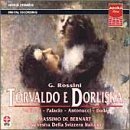| All Artists: Gioachino Rossini, Coro della Radiotelevisione della Svizzera Italiana Massimo De Bernart, Ernesto Palacio, Stefano Antonucci, Nicoletta Cilento Fiorella Pediconi Title: Rossini - Torvaldo e Dorliska / Pediconi · Palacio · Antonucci · Buda · De Bernart Members Wishing: 0 Total Copies: 0 Label: Agora Release Date: 8/5/2000 Genre: Classical Style: Opera & Classical Vocal Number of Discs: 2 SwapaCD Credits: 2 UPC: 789368724123 |
Search - Gioachino Rossini, Coro della Radiotelevisione della Svizzera Italiana Massimo De Bernart, Ernesto Palacio, Stefano Antonucci, Nicoletta Cilento Fiorella Pediconi :: Rossini - Torvaldo e Dorliska / Pediconi · Palacio · Antonucci · Buda · De Bernart
 | Gioachino Rossini, Coro della Radiotelevisione della Svizzera Italiana Massimo De Bernart, Ernesto Palacio, Stefano Antonucci, Nicoletta Cilento Fiorella Pediconi Rossini - Torvaldo e Dorliska / Pediconi · Palacio · Antonucci · Buda · De Bernart Genre: Classical
|
Larger Image |
CD Details |
CD ReviewsBetween Barbiere and Cenerentola... Martin | France | 10/10/2002 (4 out of 5 stars) "Rossini wrote this semiseria 2 months before "il Barbiere". It's a nice work, not so lively as his other comic operas, more introvert but nevertheless both dramatic and sophisticated. You won't find the same fireworks as in Barbiere or Cenerentola, but the opera has it's own special quality and "tinta". The First-act finale is true Rossini, and there's a scene preceding it- a trio for the three male voices that is simply gorgeous, with a horn solo in-between. This recording is worth having only for those scene, but there are other arias and duets that also make this an enjoyable opus. There are some self-borrowings and they are specified in the accompanying booklet, but the libretto is only in italian. All the singers are good, specially Palacio who is always a stylish Rossini-singer. The Dorliska (Pediconi) is a bit edgy but since I like personal voices that's no problem for me, but there are probably people who will regard her voice as ugly. Antonucci as il Duca is also very good and the conductor too. In sum , this is an interesting work and worth having if you like Rossini's music." In-between Barbiere and La Cenerentola Martin | France | 10/09/2002 (4 out of 5 stars) "This is an opera which Rossini wrote 2 months before "Il barbiere". It hasn't got the same verve and natural situations, it's more down-to-earth and calmer, more introvert. But the melodies and arias are beautiful and dramatic. The first-act finale is true Rossini, like another scene preceding it, beginnning with the trio for 3 male voices-"A qual raggio di speranza". It's an intricately built trio with a solo passage for horn (I think it's a horn..).
There is some borrowed music and it fits in very well. The conducting couldn't be better and the singers are all good, Ernesto Palacio is a specialist known from other Rossini-recordings and he's always stylish. Dorliska (Pediconi) has a bit edgy voice but I like personal voices so for me it's a plus, and Antonucci is very good as il Duca. The text is expertly written and specifies some of the self borrowings as well as describing the work and it's origins, a libretto is also included." |

 Track Listings (16) - Disc #1
Track Listings (16) - Disc #1